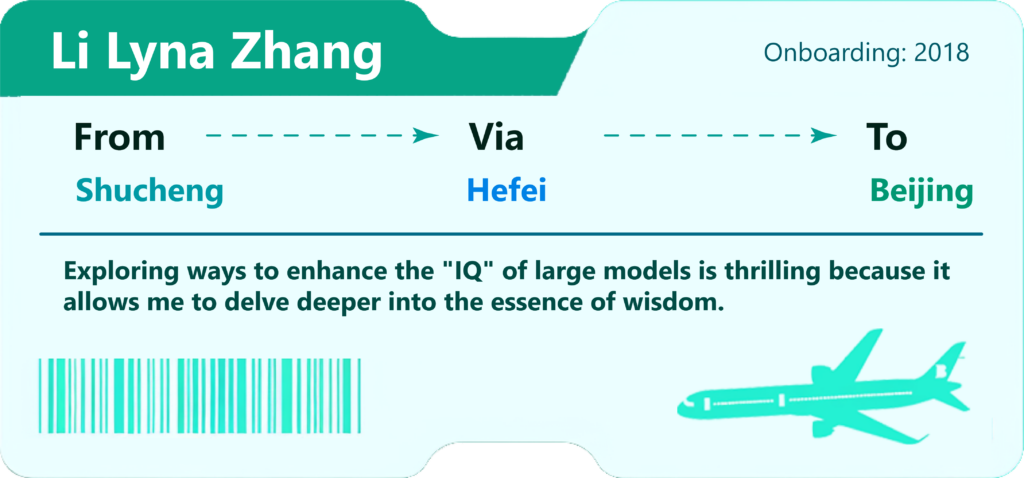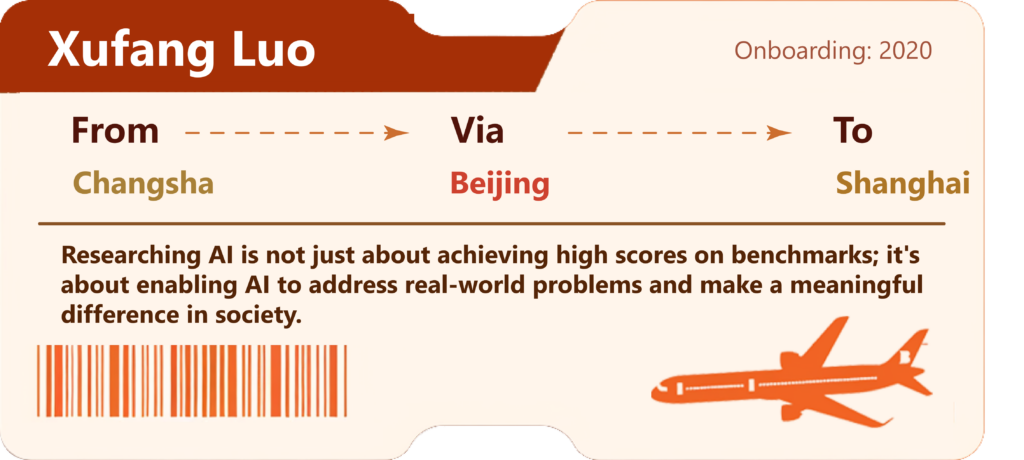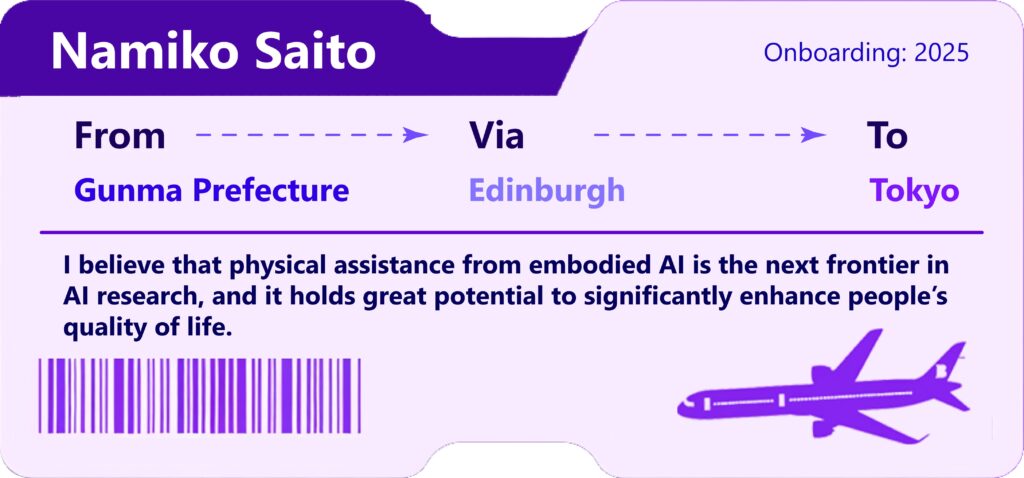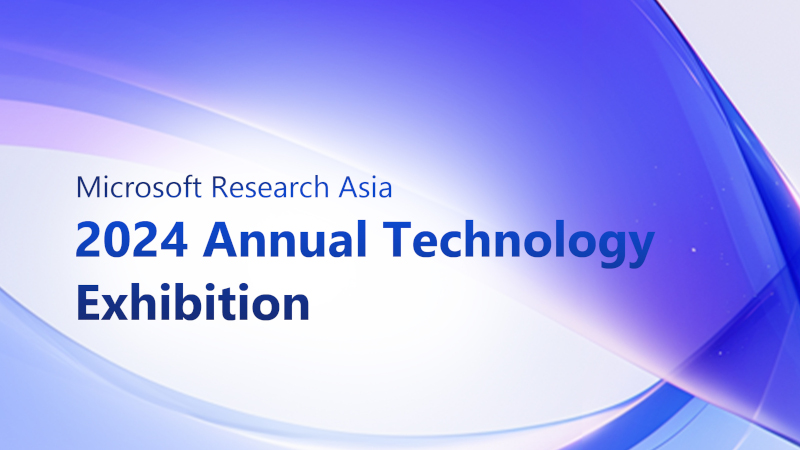On the world’s vast canvas, cultures from different regions are like unique brushstrokes, each conveying distinctive perspectives and styles. At Microsoft Research Asia, women researchers from diverse backgrounds have experienced the dynamic interplay of these cultures. Driven by curiosity and a passion for exploration, they move between cultures, gaining rich insights and deepening their understanding.
Today, they are active in various labs at Microsoft Research Asia, immersed in an inclusive research environment shaped by cultural diversity. Their experiences—past and present—not only shape who they are but also pave the way for their future as they forge extraordinary paths.
Discovering the world through personal journeys
For many, their cross-cultural journeys began during their student years. Some moved to distant cities; others crossed oceans. These experiences broadened their perspectives, revealing the vastness and diversity of the world. In honor of International Women’s Day, four women researchers at Microsoft Research Asia—Li Lyna Zhang, Namiko Saito, Jiamin Lee, and Xufang Luo—share their unique journeys.

Li Lyna Zhang: I grew up in Shucheng, Anhui Province of China, a place full of stories. Legend has it that this town was once home to the famous general Yu Zhou from the late Han Dynasty. As I grew older, my interests began to shift towards technology, and it was during the summer of my junior year in college that I landed my first internship at Microsoft Research Asia. This opportunity not only broadened my horizons internationally but also allowed me to maintain close ties with my roots. It led to the chance to pursue a joint Ph.D. program, which further enriched my perspective.
My journey eventually took me to the Beijing lab of Microsoft Research Asia, in the Haidan District. Despite jokes about the area being «boring and lacking good food,» I discovered the perfect blend of international freedom and local pragmatism, fostering the ideal environment for technological innovation and breakthroughs.
Namiko Saito: My childhood in Gunma Prefecture, Japan, was spent close to nature. Moving to bustling Tokyo to an all-girls middle school marked a significant change, as did my transition to the male-dominated mechanical engineering program at Waseda University. Today, one of my motivations at work is to inspire more young women to explore robotics and computer science, discover the infinite possibilities in these fields, and create more opportunities for themselves.
As a child, I loved making crafts, and watching robot competitions on TV sparked my interest in robotics. At university, I joined the robotics competition team, immersing myself in every aspect of robot creation—designing CAD models, fabricating parts, assembling robots, creating circuits, and programming them. These hands-on experiences deepened my love for the field.
During this time, I gained diverse academic and practical experiences both in Japan and internationally, including two years of postdoctoral research at the University of Edinburgh. The cultural differences I encountered were striking. Eastern culture, I observed, emphasizes harmony and considers others’ feelings, while Western culture encourages more direct communication and open discussion. The work styles also differ; Tokyo’s emphasis on punctuality, organization, and meticulous planning contrasted with Edinburgh’s more flexible approach to work arrangements.
These experiences across different cultures helped me realize that differences are not problems to be solved but perspectives to be understood. We should learn to appreciate different viewpoints in our communication and avoid biases.
Jiamin Li: My growth keyword is «migration.» I was born in Akesu, China, and moved to Shanghai with my family at age two. I pursued my bachelor’s and Ph.D. degrees in Hong Kong, interned at a company in Beijing for over a year, and spent nine months as a visiting student in Austin, Texas. After completing my studies, I joined Microsoft Research Asia in Vancouver.
Living in different places has been an excellent way for me to understand myself. Each move has shaped me in unique ways, helping me clarify my interests and inner desires. While moving is physically exhausting and a psychological challenge, forcing me out of my comfort zone, I’ve learned to cope by treating it as an ordinary part of life.
Xufang Luo: I was born in Changsha, Hunan Province of China, and spent my teenage years in this vibrant and lively city. With a thirst for knowledge, I went to Beijing for my bachelor’s and Ph.D. degrees. During my Ph.D. studies, I was fortunate to join the joint Ph.D. program at Microsoft Research Asia and started my internship at the research institute. After graduating, I chose to continue working at Microsoft Research Asia and joined the AI and Machine Learning group at the Shanghai lab.

Overcoming challenges and driving innovation through research
All the researchers featured in this article have different visions for the future of computer science, yet they share a common goal: creating a better future for humanity.

Xufang Luo: One of my research directions involves building powerful multimodal models and broadly applicable solutions to challenges in the fields of medicine and healthcare. This interdisciplinary research often faces information barriers between disciplines. For example, when communicating with doctors or biology experts, we first need to understand their problems, determine whether machine learning algorithms and models can provide effective solutions, and then explain the impact of these solutions.
This process has taught me that AI’s value lies not only in achieving better benchmark scores but also in truly understanding and solving real-world problems to benefit humanity. I hope our research can advance machine learning’s long-term development in medicine and healthcare, bringing meaningful improvements to people’s well-being.
Jiamin Li: My current research direction requires close collaboration with architects and hardware designers, focusing on more fundamental aspects compared with my Ph.D. studies. The practical experience I have gained at Microsoft Research Asia has deepened my understanding of hardware, no longer limited to book knowledge. Through hands-on experience, I have touched the pulse of technology and have developed insights far beyond what is available in books.
Now, I can view entire system architectures holistically, understanding how components interact within complex systems. This comprehensive perspective gives me a deeper understanding of the operations of AI systems. I feel honored and excited to contribute to developing the next generation of AI infrastructure—an effort that represents not just a technological leap but also a step toward enabling AI to better serve humanity.
Li Lyna Zhang: Although current research results have significantly improved the reasoning ability of large models, we’re still far from achieving true general AI. I look forward to continuing to explore the potential of large models’ «IQ and reasoning capabilities with my team, pushing the boundaries of the «intelligence ceiling.» I hope our research can promote the true development of AI, bringing more benefits to society as a whole.
Namiko Saito: AI has already become an integral part of our lives, and I believe embodied AI will be the next important development. This technology will equip AI with powerful physical interaction capabilities, enabling more natural and meaningful human-AI interactions. Breakthroughs in this area will not only bring more convenience but also greatly improve our quality of life.

Pursuing scientific breakthroughs in a diverse cultural environment
In a diverse and inclusive environment, these researchers have the freedom to follow their passions, exploring the boundless world of scientific discovery and advancing the frontiers of science.

Jiamin Li: My research journey began in Hong Kong, a vibrant and fast-paced city, and the research atmosphere was the same. In North America, I experienced a different style—more relaxed, but equally competitive. Surrounded by breakthrough achievements from top computer talents worldwide, it’s hard not to feel some pressure, but this also became my motivation to keep moving forward.
Vancouver is the most culturally diverse city I have lived in. People here are open-minded and inclusive. This diversity is also reflected at the Vancouver lab, where I work with colleagues from different academic backgrounds. Initially, this diversity presented challenges in having a shared understanding of certain basic concepts. But over time, this actually helped me improve my understanding and ability to express my ideas clearly.
I believe that research is essentially a neutral endeavor. When discussing research content, personal background, cultural differences, and other factors all take a back seat. What truly matters is the ideas themselves—the persuasiveness of arguments, clarity of reasoning, and depth of insights. Although we come from different places and have different backgrounds, we all share a common goal: to advance research.
Xufang Luo: After joining the Shanghai lab, I was immediately struck by the strong atmosphere of diversity. My research group alone includes researchers from multiple disciplines, such as computer vision, natural language processing, theoretical research, and reinforcement learning.
Collaborating with colleagues from different backgrounds always brings unexpected benefits. For example, colleagues researching systems share the latest advances in model optimization, deepening my understanding of technical details. Colleagues studying wireless systems inspire me with their cool demos of new technologies. Even colleagues in the AI for Science group engage me in cutting-edge scientific discussions beyond the computer field. The diverse composition of my team allows us to view problems from different perspectives, which I believe is very helpful for fostering innovation.
Namiko Saito: Last August, I found myself at a crossroads, contemplating whether to remain in the UK when I came across recruitment information for Microsoft Research Asia – Tokyo. After careful consideration of how different choices would impact my future development, I firmly believed that joining Microsoft Research Asia presented the perfect opportunity.
I am very eager to participate in the establishment of the new Tokyo lab, especially with the embodied AI project. My research, which focuses on robot control and machine learning, aims to enable robots to perceive their environment and plan actions through real-world interactions. Microsoft Research Asia’s philosophy aligns closely with my goals, giving me the confidence that I can fully integrate my passion and expertise to realize my value here.
Upon arriving at the Tokyo lab, I was immediately drawn to Microsoft Research Asia’s cultural environment. It emphasizes collaboration and communication, with frequent face-to-face discussions about research directions, methods, and strategies. This open environment complements the emphasis on harmony and organization in Japanese research culture, creating a unique balance that promotes teamwork while fully respecting different viewpoints.
Li Lyna Zhang: In the later stages of my Ph.D., I developed a growing interest in transitioning to the field of AI, even though I lacked the relevant experience in this area. Among the job offers I received, Microsoft Research Asia stood out because it does not limit research directions. Here, besides conducting cutting-edge research, the emphasis is on providing researchers with the freedom to explore. This environment allows me to pursue the direction I truly love.
Moreover, Microsoft Research Asia encourages bold risk-taking and exploration, even tolerating failure. For example, in January, our team achieved a breakthrough with rStar-Math, advancing the mathematical reasoning ability of large models. In the early stages, we faced numerous challenges and limitations, but colleagues from different research groups extended a helping hand, working together to push the experiment forward. This open and supportive research atmosphere allows every good idea to take root, blossom, and bear fruit.

Shining in their unique way outside of work
These researchers are talented and down-to-earth, balancing their demanding professional lives with personal hobbies and challenges. Drawing from these experiences, they offer meaningful advice to other women navigating their careers in research.

Namiko Saito: I am always willing to try new things. During my internship in Italy, I joined a local football team; in Edinburgh, I participated in art clubs, dance groups, and even tried archery and rock climbing. I also took part in street singing. Currently, I am a member of the company’s yoga club.
These experiences enrich my life and help me connect with people from different backgrounds and cultures. Sometimes, my hobbies inspire my work. For example, my love for cooking led me to participate in a project teaching robots how to serve soup and make scrambled eggs.
Whether at work or in life, I believe it is important to take the first step towards your interests. Don’t worry about the reasons—just take the leap, and you might meet great partners and gain a lot on your journey!
Li Lyna Zhang: Outside my busy research schedule, I enjoy switching contexts to recharge in completely different ways. Fitness has always been a part of my routine—it keeps me healthy, clears my mind, and allows me to focus on the moment. I truly appreciate these brief moments of relaxation.
Additionally, I love watching shows and reading, as they immerse me in different stories and perspectives, letting me experience the lives of different people. This ability to explore the world from different perspectives not only helps me unwind but also deepens my understanding of life.
Inspired by the philosophy of Lee Hyori, whom I admire, I’ve come to realize that true happiness isn’t just about chasing results but about discovering what you truly want and enjoying the journey. Loving life and loving yourself are among the most valuable skills to cultivate.
Jiamin Li: Reading has been my consistent hobby over the years. I especially love philosophy and history; they help me perceive the world more clearly when my thoughts become blurred. The world has existed for thousands of years, and the path I walk has actually been trodden by countless others before me. Reading provides a gateway into the thoughts of others, reminding me that I am not alone on this journey.
I also feel fortunate to live in an era where female consciousness is rising and being clearly expressed. I believe that women have unlimited potential and abilities, can stand out in any field, and that we are witnessing all this becoming a reality.
Xufang Luo: The story of the «50-year-old aunt’s self-driving tour» deeply touched me, encouraging me to pursue what I truly want. Traveling has always been my greatest hobby, and in the future, I might find more reasons to «go out.»
Life should not be a unvaried path but a picture composed of countless different scenes. We don’t always need to compare ourselves to others; making ourselves happy is what matters most.


